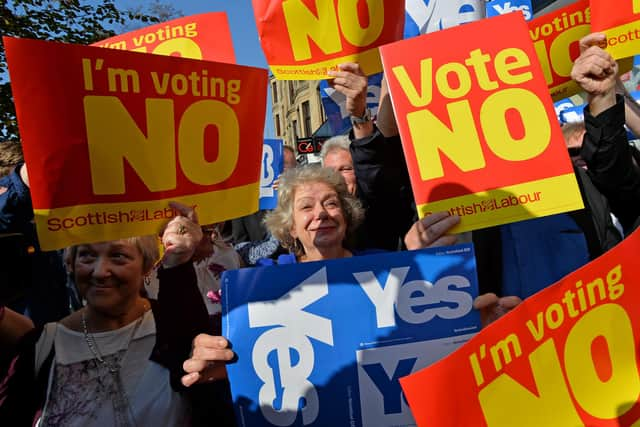Why UK politicians should rule out Indyref2 and move the goalposts on Scottish independence – Professor Derrick Wyatt QC
Neither international law nor domestic law gives Scotland a legal right to leave the UK. The only route to independence lies via cooperation with the UK Government and legislation by the Westminster Parliament.
There is no compelling reason why the UK Government and the main UK-wide opposition parties should recognise an Indyref1-style, one-off referendum as opening the route to independence.
Advertisement
Hide AdAdvertisement
Hide AdThey should say that they do not do so and spell out the conditions that Scotland should satisfy to achieve independence.
Brexit was won by a small margin of 51.9 to 48.1 per cent in June 2016, but the effects of Brexit did not begin to be felt by the public until the beginning of 2021, when the UK had finally left the Single Market and Customs Union.
Opinion polling suggests that a re-run of the Brexit referendum would produce a different result. Brexit is one of those events which is difficult and perhaps impossible to reverse. Scottish independence would be another, even if the Scottish electorate had changed its mind by the time independence came to pass.
Some of the effects of Scottish independence would be damaging to the interests of the rest of the UK. That is not an argument for the UK Government to rule this out, but it is an argument for only recognising that independence if the will of the Scottish electorate appears to be settled and likely to endure, and if the interests of the rest of the UK are respected.


The costs and disadvantages to Scotland of leaving the UK have been much discussed. Those to the rest of Britain less so. Scottish independence would create a customs border between the two countries which would be disruptive and economically damaging for residents and businesses south as well as north of the border – exports to Scotland from the other UK nations have been estimated at 3.5 per cent of the GDP of the rest of the UK.
Scottish independence would pose challenges both for the new state’s own defence policy and for that of the “New UK” (NUK) which would emerge.
If current SNP policy were followed, it seems likely that the NUK nuclear deterrent would have to leave Scotland, despite the fact that most Scots currently support it. The process would take years and would be costly, and the future of the NUK deterrent could be put in doubt.
This could pose a threat to Nato’s policy of nuclear deterrence, which will lean heavily on the nuclear weapons capabilities of the UK and France in periods when an American president is in office who is a less determined supporter of European defence than is the present president.
Advertisement
Hide AdAdvertisement
Hide AdUK politicians should come out and say that one condition for the UK recognising the independence of Scotland would be a majority vote in two referendums, both of which would require the approval of the UK Government. This idea was advanced by former Prime Minister Sir John Major in 2020.
The two-vote scenario would play out as follows. If the Scottish electorate voted “yes” in the first referendum, negotiations on issues such as trade and border arrangements, a defence pact, the Faslane Naval Base, division of the national debt and military and other assets, and currency arrangements, would begin.
A second referendum would take place after agreement on all outstanding matters had been reached, and after a period of Scottish financial autonomy. At that stage, the shape and feel of independence would have become clearer to the Scottish electorate.
It would be understood from the outset that the UK would only recognise Scottish independence if the legitimate interests of the rest of the UK were adequately protected by the settlement agreed between the parties.
One area of sensitivity would be defence. As the terms of a defence pact and the future of the UK nuclear deterrent would affect Nato’s defence of Europe, the alliance, as well as the UK, would expect some solidarity from Scotland as an aspiring member.
As the Nato Council put it in 2020, its members “are determined to ensure that Nato’s nuclear deterrent remains safe, secure, and effective, and reject any attempt to delegitimise nuclear deterrence”.
The more that UK politicians respond to SNP calls for Indyref2 with the mantra that now is not the time, the more they confirm the expectation that there will indeed be an Indyref2, and that a one-off bare majority vote for “yes” in that poll will guarantee independence.
It is time to move the goalposts, to ensure a more reliable mechanism for any further testing of Scottish opinion on independence, and to flag up the inescapable fact that the UK Government will only recognise an independent Scotland if the interests of the rest of the UK are respected.
Advertisement
Hide AdAdvertisement
Hide AdThis article is based on a blog by the same author published by the London School of Economics and Political Science.
Derrick Wyatt, QC is emeritus professor of law, University of Oxford, where he taught EU law, constitutional law, and international law. He was formerly a barrister specialising in litigation before the EU courts and is currently a member of the International Academic Council of Fide Fundación, an independent and non-partisan Spanish think-tank.
Comments
Want to join the conversation? Please or to comment on this article.
